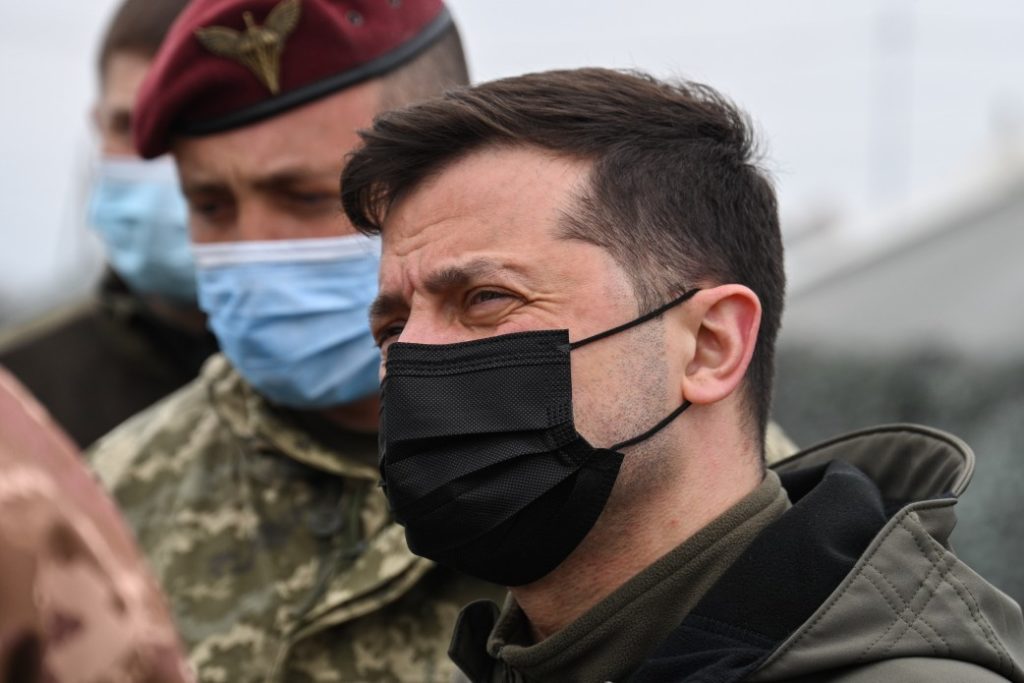Kyiv
Ukrainian President Volodymyr Zelensky’s overtures over the last week, aimed at meeting Kremlin leader Vladimir Putin, have so far been met with dismissiveness from Moscow. Even derision.
The sting is compounded by the fact that the comedian-turned-leader of the country of 40 million was elected on a platform of mending ties with Russia. Specifically, resolving the conflict with Moscow over its support for proxies it backs financially and militarily in the eastern Donbass area.
But Zelensky seems undeterred.
Zelensky has concentrated his diplomatic efforts on Europe.
But other than soothing words of encouragement, the European Union, which is not a military bloc, is limited in its scope of action.
He portrays his nation as vital to Europe’s future. Kyiv has aspirations to one day join the EU.
“Ukrainians are influencing Europe’s overall destiny. It is in our country that the nature of Europe’s future will be determined,” Zelensky told a summit of five regional leaders in Poland.
“We are overseeing Ukraine’s integration into the commonwealth of European countries and it will show that the fundamental values of freedom, democracy and equality on our continent are key elements to significant progress and development.”
Bombast, rather than decision-making, may have dominated the meeting, attended by the presidents of Poland and ex-Soviet Estonia, Latvia and Lithuania, all too aware of the meaning of a Russian military presence.
“Ukraine needs a clear signal concerning its prospects for Europe and Euro-Atlantic matters,” he told the Polish president. “All these questions that keep accumulating. Like ‘later’, ‘sometime’ or ‘in 10 years’, we need to put an end to them.”
All of the diplomatic action is taking place against the backdrop of a recent military build-up by Moscow along Ukraine’s borders.
SYMBOLIC SIGN OF WESTERN SUPPORT
Evidently, Zelensky’s efforts have attracted attention.
U.S. Secretary of State Anatoly Blinken will visit Kyiv on Thursday. Obviously, in order to show U.S. support for Ukraine.
But the Ukrainian president may also face uncomfortable questions – including his administration’s mixed record on trying to reduce systemic corruption.
Moscow last month massed at least 100,000 troops in what it later called “drills” but which seemed to be aimed at unnerving Kyiv, replete with Kremlin rhetoric that a new conflict could result in the destruction of Ukraine.
Moscow later said it was pulling back its troop surge, which is logistically not so clear, given that many units in the mass deployment are based in Russian units not far from Ukrainian borders.
And once it did “pull back”, the Kremlin promptly announced a maritime hard-ball play, effectively hampering access to Ukrainian industrial ports like Mariupol.
It has periodically interfered with sea traffic in the Sea of Azov, which is the access bay to the greater Black Sea, since 2014, but this time said it would formally restrict Ukrainian naval traffic in the area until October, a further blow to Ukraine’s fragile economy.
RUDE AWAKENING
Zelensky has gone full circle on the issue of how to recover the seven percent of the country’s territory seized by separatists in 2014 soon after Russia annexed Crimea in the aftermath of the mass protests that turfed out Russia-friendly president Viktor Yanukovich.
When running for office in 2019, he suggested a peace deal could be struck by “just stopping the shooting”.
He is now on record as saying NATO membership for Ukraine is the only way to end the conflict that has killed more than 13,000. And he rejects Putin’s disdainful suggestion that he talk directly to the leaders of the two Russian-bankrolled separatist “people’s republics”.
U.S. SECRETARY VISIT NOT ONLY ROSES
With Russian actions uncertain after at least a cosmetic drawdown on the border, Blinken’s visit is certain to produce stock American expressions of support for Ukraine’s “territorial integrity”.
But Blinken has also made clear he will make a point of other issues seen in the West – not least by the International Monetary Fund – as important to uphold Ukrainian democracy and market-based prosperity.
These are mainly serious judicial and economic reforms, what the secretary of state sometimes describes as Ukraine’s “internal threat”.
At the top of that agenda will be the dismissal last week by cabinet order of the CEO of state-run Naftogaz, Ukraine’s largest oil and gas company. Zelensky’s administration bypassed the company’s supervisory board – a move denounced by both U.S. and EU officials as a flagrant violation of the principles of corporate management.
Analysts and opposition politicians have suggested that the dismissal of CEO Andriy Kobalyev, praised for weeding out corrupt practices, could jeopardise the resumption of disbursements of a $5 billion IMF standby programme. That programme is under scrutiny to ensure Ukraine is meeting the very criteria raised by Blinken on reforms and an independent judiciary.
“It’s not about the concrete performance of (Naftogaz) management, it’s a decision against corporate governance reform,” former Prime Minister Oleksiy Honcharuk told U.S.-funded Radio Free Europe-Radio Liberty with reference to Kobolyev’s dismissal.
“For Zelensky and his team, it is very important to have total control,” said Honcharuk, dismissed in March 2020.

